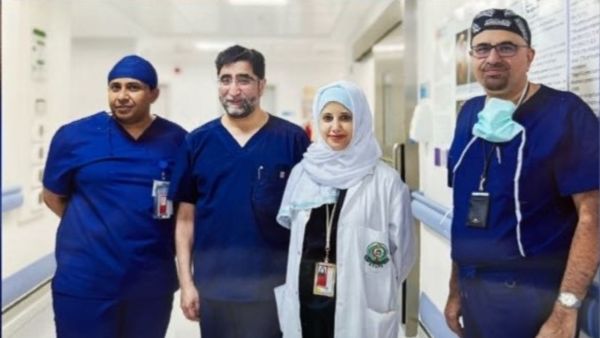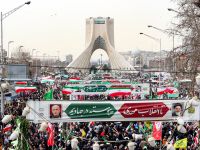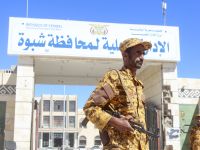KING FAHD ARMED FORCES HOSPITAL BEGINS TRIAL OF NEW BIOADAPTIVE ANGIOPLASTY PROCEDURE FOR HEART DISEASE TREATMENT

KSA, April 29, 2024 – King Fahd Armed Forces Hospital is first in the Kingdom of Saudi Arabia to begin clinical research and now offer a new type of angioplasty procedure with the DynamX bioadaptor implant, an innovation beyond stents designed to restore vessel function.
The bioadaptor is a transforming implant that, after the period of healing, unlocks and allows the artery to pulse and function more naturally in response to a patient’s exertion and heart’s changing needs. More normal artery motion and expansion help the artery restore its healthy function and reduce the risks of secondary adverse events such as heart attacks or repeat procedures. The new procedure is being offered to patients under the leadership of Dr. Mirvat Alasnag, Head of Catheterization Lab, Dr. Khalid Al Shaibi, Director of Cardiac Center, and Dr. Waqar Ahmed, Interventional Cardiologist, Dr.Salem Assiri, Interventional Cardiologist, and Dr. Sultan AlOtaibi, Interventional Cardiologist.
“We are pleased to offer bioadaptive angioplasty at King Fahd Armed Forces Hospital to patients suffering from coronary artery disease, and especially for those who are younger and seek to reclaim an active lifestyle,” said Dr. Mirvat Alasnag, MD, Head of the Catheterization Laboratory at the King Fahd Armed Forces Hospital in Jeddah, Saudi Arabia. King Fahd Armed Forces Hospital, one of the premier hospitals and clinical research centers, is also participating in the global BIO-RESTORE post-market registry for bioadaptor to generate diverse, in-market experience, specifically in Saudi patients.
The bioadaptor is a metallic coronary device that is implanted via a minimally invasive angioplasty procedure. It is designed to provide dynamic vessel support and establish adaptive hemodynamic modulation of the artery, enabling vessel function and motion and increased blood flow. It consists of three thin metal alloy helical strands held together temporarily by a bioabsorbable coating to provide strength when opening artery blockage. Unlike traditional stents, after the period of healing and coating resorption in the first six months, the bioadaptor unlocks and the helical strands separate thereby uncaging the vessel and establishing more natural and dynamic support of artery motion and function.
Bioadaptors can also expand slowly over time along with the artery in order to maintain good blood flow.1 Recent findings also show stabilization and even shrinking of plaque volume in arteries treated with bioadaptors.2
Coronary artery disease (CAD) is the most common form of heart disease in the world3 and a leading cause of death.4 It is caused by a buildup of fatty deposits and other substances in the walls of the arteries that supply blood to the heart and other parts of the body. Over time, the buildup causes the inside of the arteries to stiffen and narrow, and lose their natural functions, which can partially or totally block the flow of blood and nutrients to the heart. Chest pain is the most common symptom of CAD. For many people, a heart attack is the first sign that they have CAD.
1. Verheye, S. et al. Twelve-month clinical and imaging outcomes of the uncaging coronary DynamX bioadaptor system. EuroIntervention 2020;16:e974-e981.
2. Saito, S, et al. First randomised controlled trial comparing the sirolimus-eluting bioadaptor with the zotarolimus-eluting drug-eluting stent in patients with de novo coronary arty lesions: 12-month clinical and imaging data from the multi-centre, international, BIOADAPTOR-RCT. The Lancet Nov 2023; 1-13.
3. Coronary artery disease. Centers for Disease Control and Prevention. Accessed August 21, 2021. https://www.cdc.gov/heartdisease/coronary_ad.htm
4. World Health Organization Web site. Cardiovascular diseases (CVDs) [Internet]. 2017 [cited 2017 Dec 19]. Available from: http://www.who.int/mediacentre/factsheets/fs317/en/
Background Information
King Fahd Armed Forces Hospital
The King Fahd Armed Forces Hospital is situated in the busy seaport of Jeddah on the western seaboard of the Red Sea. Initially there was only a 76-bed Armed Forces Hospital in Jeddah. However, to meet the medical needs of the personnel of all of the Armed Forces Installations there, a new and progressive 420-bed Armed Forces hospital was directed to be built by His Royal Highness Prince Sultan bin Abdul Aziz Al Saud, Second Deputy Premier, Minister of Defense and Aviation and Inspector General. Now, the hospital has five city-wide satellite clinics form part of a KFAFHnational network of healthcare facilities directly managed by the Medical Services Division (MSD) of the Ministry of Defense and Aviation (MODA).
One of the primary concerns of the Ministry of Defense and Aviation is to provide medical care to all of the Armed Forces personnel. Therefore, medical services have been establised in all military locations.
The hospital provides a wide range of primary, secondary and tertiary medical services to members of the Saudi Arabian Armed Forces and their dependents. The Cardiac Center, situated within the main hospital, is the only adult cardiac surgical facility in the Western Region.
In-service training and education are actively promoted by the Departments of Medical Education and Nursing Education and from within the individual departments. The programme includes a weekly hospital Grand Round, monthly Nursing Grand Rounds and regular nursing study days. Inter- and intra-departmental activities include seminars, case presentations and Journal Clubs. The hospital is also a designated training center for junior medical and nursing staff.
All departments and units, both medical and non-medical, have written Policies and Procedures to ensure delivery of consistent levels of quality care and service.
King Fahd Armed Forces Hospital
The King Fahd Armed Forces Hospital is situated in the busy seaport of Jeddah on the western seaboard of the Red Sea. Initially there was only a 76-bed Armed Forces Hospital in Jeddah. However, to meet the medical needs of the personnel of all of the Armed Forces Installations there, a new and progressive 420-bed Armed Forces hospital was directed to be built by His Royal Highness Prince Sultan bin Abdul Aziz Al Saud, Second Deputy Premier, Minister of Defense and Aviation and Inspector General. Now, the hospital has five city-wide satellite clinics form part of a KFAFHnational network of healthcare facilities directly managed by the Medical Services Division (MSD) of the Ministry of Defense and Aviation (MODA).
One of the primary concerns of the Ministry of Defense and Aviation is to provide medical care to all of the Armed Forces personnel. Therefore, medical services have been establised in all military locations.
The hospital provides a wide range of primary, secondary and tertiary medical services to members of the Saudi Arabian Armed Forces and their dependents. The Cardiac Center, situated within the main hospital, is the only adult cardiac surgical facility in the Western Region.
In-service training and education are actively promoted by the Departments of Medical Education and Nursing Education and from within the individual departments. The programme includes a weekly hospital Grand Round, monthly Nursing Grand Rounds and regular nursing study days. Inter- and intra-departmental activities include seminars, case presentations and Journal Clubs. The hospital is also a designated training center for junior medical and nursing staff.
All departments and units, both medical and non-medical, have written Policies and Procedures to ensure delivery of consistent levels of quality care and service.






